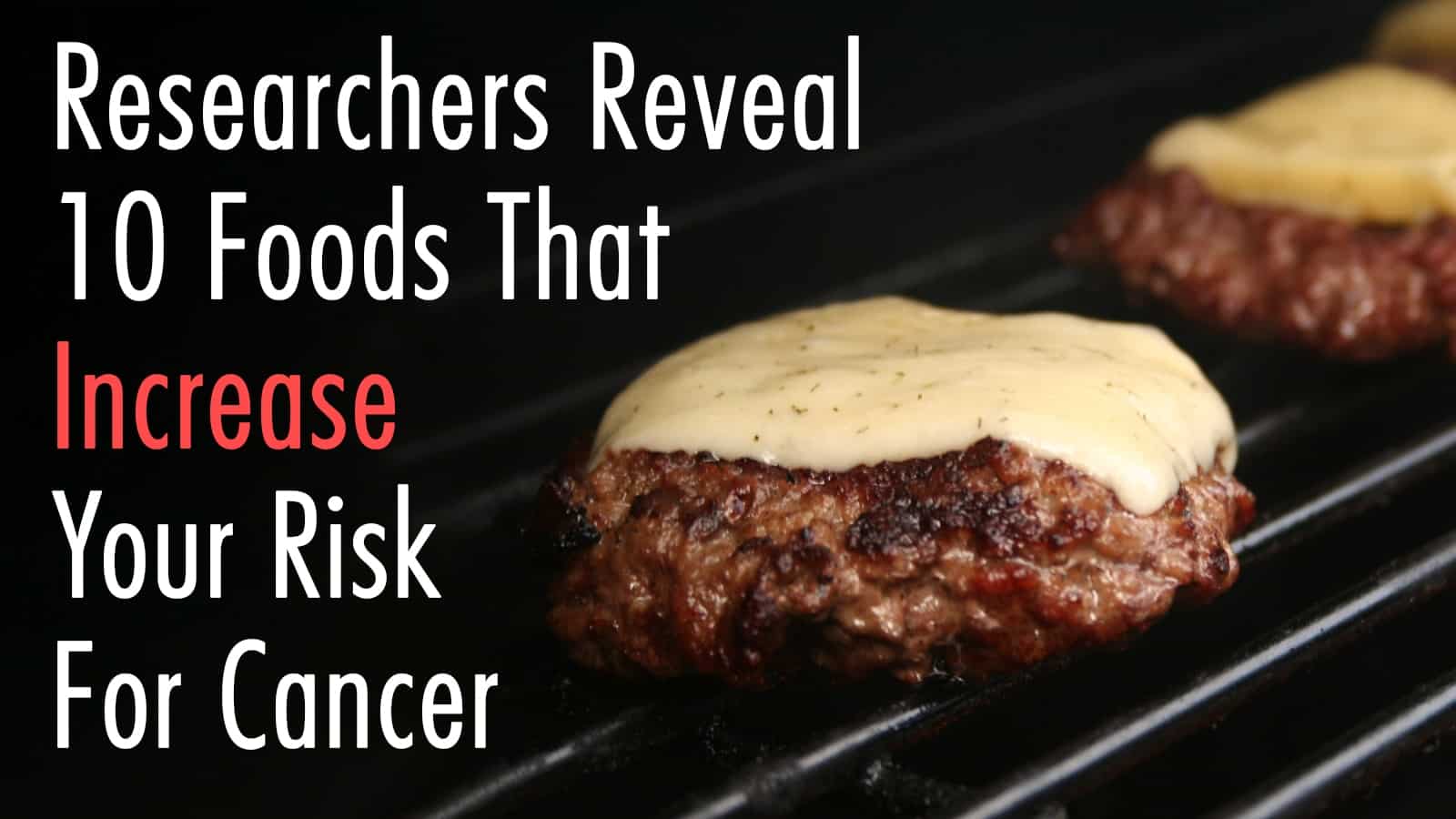You already know that your diet impacts your health. Experts reiterated in a study on PLOS Medicine that if you avoid eating certain foods, you will not just lower your risks for heart disease and diabetes but you will also lower your risk for cancer.
Today, the buzzword seems to be that “everything causes cancer.” But the PLOS study showed you won’t automatically develop the disease if you have fast-food dinners as an occasional indulgence. Rather, you could develop cancer if you generally have a poor diet and consistently eat meals that are high on sugar, salt or fat. Here are some foods that researchers say will definitely increase your cancer risks.
Here Are 10 Foods That Increase Your Risk For Cancer
1. Barbecue or grilled meat
Everyone loves a good barbecue because the meat cooks fast while still maintaining its juicy flavor. There’s also something mouthwatering about charred meat that may be why it’s a popular backyard and summer party food in America.
You might think that barbecuing or grilling is healthier than frying since the meat isn’t soaked in oil. However, experts at the Center for Integrated Research in Cancer and Lifestyle (CIRCL) and the American Cancer Society (ACS) said that this cooking process may activate cancer-causing chemicals.
When you’re barbecuing, you’re cooking meat in high temperatures. This triggers the release of chemicals like heterocyclic amines (HCAs) and polyaromatic hydrocarbons (PAHs). Both chemicals are known carcinogens, as proven in experiments done on animal subjects that developed cancer tumors. The HCAs cause the charring marks on the meat while the PAHs come from the fat dripping from the meat to the grill.
This isn’t to suggest that you completely ditch barbecued meat. You just need to learn to grill the proper way if you can’t bake or broil your food.
- Grill more chicken or fish, more fruits and vegetables, and less red meat.
- As much as possible, use grass-fed steak meat.
- Ditch the tilapia because this fish has no healthy oils.
- Flip what you’re barbecuing often to avoid charring.
- Wrap up the food you barbecue in a foil to lessen the effects of the chemical release.
- Control your use of marinades. Lightly season your food with olive oil, herbs and spices, and some pepper.
2. Microwave popcorn
Microwave popcorn, while convenient, may prove harmful. (Have you ever wondered about those linings inside a microwavable popcorn bag?) The nonstick coating apparently contain a chemical called perfluorooctanoic acid (PFOA). Animal studies revealed that PFOA can raise the risk of cancer in the liver, pancreas, and the testicles.
You can, however, still enjoy eating popcorn for its fiber-rich benefits. Nutritionists say you should air-pop it and don’t add too much salt, sugar, and butter. Still, indulging in popcorn while watching a movie provides a more positive diet than potato chips.
3. Soda, including diet drinks
Drinking a can of ice-cold soda might give you a relief from the heat. (The high sugar content will also provide an energy boost.) But it’s precisely this sugar content that makes soft drinks a cancer-causing beverage.
Evidence shows the indirect links of sugar to the progression of cancer cells, especially if your body is taking in more calories than it can burn. The body needs sugar to process energy. But too much of it can turn to fat that may lead to the development of different diseases, including cancer.
While researchers continue probing how sugar and cancer directly tie up, soda drinks also contain additives and chemicals like 4-methylimidazole (4-MI). These ingredients are carcinogens. Even “diet” sodas, supposedly the healthier alternative, contain these chemicals.
4. Processed meats, pickled food
Foods like bacon, ham, hot dogs, and other deli favorites go through a thorough process to preserve taste and palatability.
- Processed meats are cured, salted, and smoked. Processed vegetables have been pickled and fermented before reaching the market.
- This makes these foods last longer and makes them more flavorful. Unfortunately, it also increases the food’s cancer-causing effects.
- Processed and pickled food is filled with sodium nitrate and other chemical preservatives.
Researches reviewed 800 studies on processed food. They learned that a person can raise his colorectal, pancreatic, or prostate cancer risks by 18 percent if he’s fond of eating 50 grams of processed food every day. This is roughly the portion of one hotdog and four bacon strips.
Experts, therefore, say that you should limit eating processed meat to less than 20 grams per serving. Also, avoid consuming processed meat and pickled food every day because it would be like smoking a cigarette on a daily basis.
5. Canned goods
Canned goods contain the controversial chemical Bisphenol A (BPA). This is a man-made industrial component widely used in the manufacture of packaging and containers. It’s also in the resin that seals canned goods and drinks. BPA can interact with the food content. Those that contain high acidity, such as tomatoes, can make this chemical more concentrated thus increasing its cancer-causing effects.
Researchers say that BPA can disrupt the functions of the endocrine. Therefore, it interferes with how the hormones work. Even small amounts of BPA can impact developing hormones in young children. For this reason, many countries, such France, China, and the United States, have banned the use of BPA in manufacturing baby food containers.
Experts from Breast Cancer UK say that low-levels of BPA exposure can change breast tissue development. BPA has also linked to prostate cancer, diabetes, heart disease, and obesity.
6. Beer and alcohol
The habitual drinking of beer and alcohol is a leading cause of cancer development. It’s a close second to the toxins that smoking cigarettes bring. Beer and alcohol can damage your liver, colon, esophagus, rectum, and mouth. It can also lead to breast cancer.
Some alcoholic drinks, like red wine, have a positive effect on the heart if consumed in moderation. Researchers pegged that a moderate amount is about five ounces of wine and 12 ounces of beer per day for women. Men can have twice the servings if they have a higher body weight.
7. Genetically-modified foods
You may have heard of GMO or genetically-modified organisms. Introduced in the food manufacturing process in the 1990s, GMO foods have provided humans with an ample food supply. Today, 90 percent of soy, corn, and many other crops derive from GMOs. However, those against biotechnology say that there were no adequate tests done to ensure that GMOs are safe for long-term human health.
- It requires chemicals to grow these crops for food, thus one can conclude that GMOs might cause cancer and tumor growth.
- Since the production of GMO foods, researchers have discovered a significant increase among people with chronic illnesses.
- An increasing number of children have also developed autism and other serious health problems at a young age.
Biotechnology is not just used by food manufacturing companies with big farms. It’s also used in the supply of livestock, chicken, and fish markets.
Proponents fighting the use of GMOs insist that you should buy produce, meat, and fish from locally-grown sources that don’t rely on biotechnology. Look for foods that are organically manufactured. This will help to ensure that you’re not ingesting chemicals from the food you eat.
8. Red meat
Like processed meat, red meat (beef, pork, and lamb) is also associated with cancer. According to the American Institute for Cancer Research, consuming 18 ounces of red meat a week puts you at a high risk for the disease’s development.
If you like to eat hamburgers and steak on regular basis, you raise your chances of having cancer, especially colon cancer, by 20 to 22 percent. Yes, the occasional indulgence for red meat can provide the proteins that your body needs for strong muscles. When you do eat red meat, stick to organic or grass-fed sources.
9. Foods made with white flour
Do you know that white flour, or refined flour, is processed using a chemical product? The flour needs to be bleached with chlorine so that it will look more appealing as a food ingredient.
- The process of bleaching actually kills most of the nutrients.
- When you’re enjoying bread, pizza dough, cakes and pastries baked with white flour, you’re actually eating food that has no nutritional value. Additionally, it might cause cancer.
- White flour also triggers a high glycemic rate that raises your body’s blood sugar levels.
- It’s no wonder why people who are on a diet, or obese, or at risk for diabetes are advised to avoid foods made with white flour.
Experts have linked white flour to breast cancer in women. Apparently, consuming food made with white flour can raise a woman’s breast cancer risks by 220 percent. Its consumption concerns many health experts.
10. Foods with hydrogenated oil
Hydrogenated oil is not naturally extracted like olive oil. It turns unsaturated fat into solid fat when added with hydrogen. Part of its manufacturing process results in the creation of another type of oil called trans fat. The most common type of hydrogenated oil is vegetable oil, which is mostly used for frying food.
Researchers say that while hydrogenated oil has a longer shelf life, it can change the structure of the body’s cell membranes so it makes a person prone to diseases. It’s filled with omega-6 fats that are not healthy. Omega-6 fats have also been tied to heart diseases and birth defects. Experts say that you should never cook using hydrogenated oil. Instead, switch to canola oil, soy-based oil, or olive oil for the healthier alternatives.
Final Thoughts On Foods That Increase Your Risk For Cancer
Most foods, in general, are not as carcinogenic as smoking, deadly viruses, and radiation. But if you are aware of which foods might cause higher cancer risks, you can actively watch what you eat, consume food in moderation, change your diet, or avoid unhealthy foods altogether.
It’s not completely bad if you sample some of these foods on the list. However, the key here is to eat in moderation and have a well-balanced diet to enjoy a healthier lifestyle.













 Community
Community

